What Is Sleep Deprivation? – Sleep deprivation is considered a global epidemic, affecting [1] 45% of the world’s population. In 1942, the average amount of sleep that people got was 8 hours, now people are down to 6.8 hours of sleep per night on average, a loss of 1.2 hours. In fact, there is no country in the world whose people achieve 9 hours on a regular basis. Sleep deprivation is pervasive, considering that the recommended amount of sleep for an adult ranges from 7-9 hours. The more sleep deprivation we experience, the bigger our sleep debt [2]. (Sleep debt measures the discrepancy between the amount of sleep you need and how much you actually get).
Sleep deprivation is more than not being able to get an ample amount of sleep. The condition occurs when:
- You are not able to fall asleep
- You are not able to stay asleep
- You are sleeping at non-typical times of the day (disrupting the regular sleep-wake cycle)
- You have a sleep disorder that causes either poor sleep quality or not enough sleep
Insomnia and sleep-related issues have been the topic of studies throughout the world.
Sleep loss is a serious problem. It affects every part of our body from our brain to our immune system to our heart.
Table Of Contents
What Is Sleep Deprivation • How Sleep Works
Types Of Sleep • Insomnia vs Sleep Deprivation
Causes • Symptoms • Prevention

How Sleep Works
To understand what sleep deprivation [3] is, it is crucial that we understand how sleep works. There are three cycles that our brain experiences: wakefulness, REM (rapid eye movement), and NREM stages of sleep [4], (this is called the sleep-wake cycle). Wakefulness, the first stage, is when we are conscious and experiencing the external world. The latter two stages are cycles of sleep. Each of the three cycles uses different parts of the brain and are quite different from each other.
Regarding our sleep cycle, both REM and NREM sleep are quite fluid. REM sleep is controlled by the brainstem. NREM is regulated by the higher brain centers. During REM sleep, we experience various levels of sensory disconnect and an inability to move. Dreaming occurs and our breathing pattern is irregular during REM sleep. Non-REM sleep includes three stages. At stage 3, we are in the deepest sleep depth. Each stage of NREM sleep and REM sleep are linked to specific brain wave activity. For instance, stage 3 of NREM sleep is termed slow-wave sleep as our brain waves are at their lowest level.
Table Of Contents
What Is Sleep Deprivation • How Sleep Works
Types Of Sleep • Insomnia vs Sleep Deprivation
Causes • Symptoms • Prevention

Types Of Sleep
During the course of his studies, Dr. Claudio Stampi [5] determined there are three different types of sleep: polyphasic sleep, biphasic sleep, and monophasic sleep.
In monophasic sleep, we sleep in a single block during a single sleep-wake cycle of 24 hours.
During biphasic sleep, we experience two blocks of sleep in 24 hours, (a night sleep and a nap).
Polyphasic sleep is quite widespread in newborn babies. It’s also very common throughout the animal world.
EEG’s indicate that humans are mainly biphasic. Typically, we experience an inherent need to sleep at night and often experience a “slump” midday.

Insomnia vs Sleep Deprivation
It’s also important to note the difference [6] between insomnia and sleep deprivation. The former refers to the inability to get an adequate amount of sleep despite being given the opportunity. Sleep deprivation refers to a reduction in the hours of sleep one gets. Although the effects of insomnia seem to cause a poor work performance and higher absenteeism, studies have not been able to conclusively rule out the possibility of underlying disorders that contribute to these effects.
Table Of Contents
What Is Sleep Deprivation • How Sleep Works
Types Of Sleep • Insomnia vs Sleep Deprivation
Causes • Symptoms • Prevention

Causes Of Sleep Deprivation
Several factors [7] can lead to a lack of sleep; some are easier to remedy than others:
- Anxiety
- Environmental factors
- Concurrent medical conditions
- Medications
- Stimulants (caffeine and energy drinks)
- Illness
- Sleep-related breathing disorders also called sleep-disordered breathing (these include obstructive sleep apnea/central sleep apnea/or a combination of both apnea disorders)
Table Of Contents
What Is Sleep Deprivation • How Sleep Works
Types Of Sleep • Insomnia vs Sleep Deprivation
Causes • Symptoms • Prevention

Sleep Deprivation Symptoms & Sleep Deprivation Effects
Those who suffer from sleep deprivation often experience observable symptoms [8] such as:
- Excessive daytime sleepiness
- Lack of coordination (clumsiness)
- Mood swings
- An overall feeling of fatigue
However, over time, serious changes are also going on inside the body:
- Increased heart rate
- High blood pressure
- Prefrontal cortex changes: These brain changes cause cognitive performance issues
- Hypothalamic-pituitary-adrenal axis (HPA axis) changes: This complex endocrine system occurs between the hypothalamus, pituitary gland and adrenal glands.
- The HPA axis [9] helps to regulate the body’s reaction to stress, as well as the digestive system, immune system, energy storage/expenditure and mood
- Alzheimer’s disease: A study [10] done by the National Institutes of Health suggests that acute sleep deprivation increases the risk of developing the protein that causes Alzheimer’s disease
Table Of Contents
What Is Sleep Deprivation • How Sleep Works
Types Of Sleep • Insomnia vs Sleep Deprivation
Causes • Symptoms • Prevention

9 Tips For Preventing Sleep Deprivation
Practicing good sleep hygiene is crucial. Incorporate and customize these steps to form your own good sleep habits:
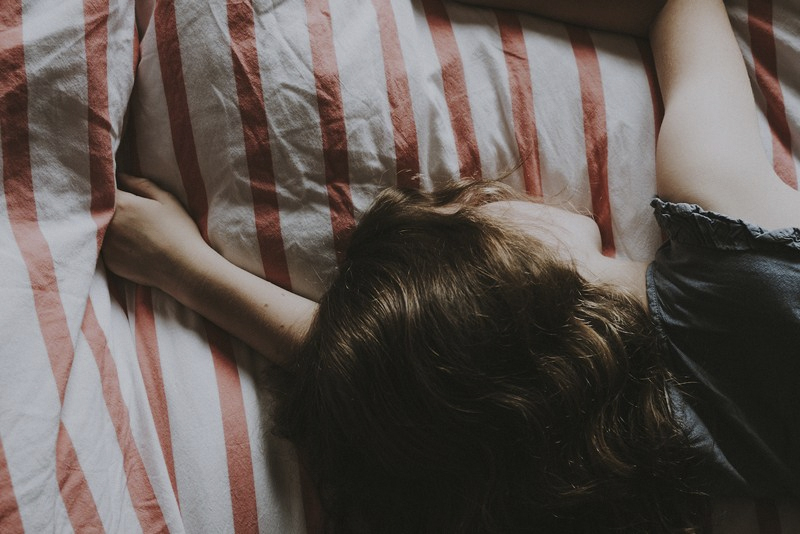
Sleep Deprivation Tip #1 – Develop a Sleep Schedule
Set and maintain a personal sleep schedule, even on weekends. Sleeping in on the weekends can actually alter your sleep pattern furthering sleep deprivation. Keeping a sleep diary can help you determine your natural circadian rhythm and stick to its ebbs and flows.
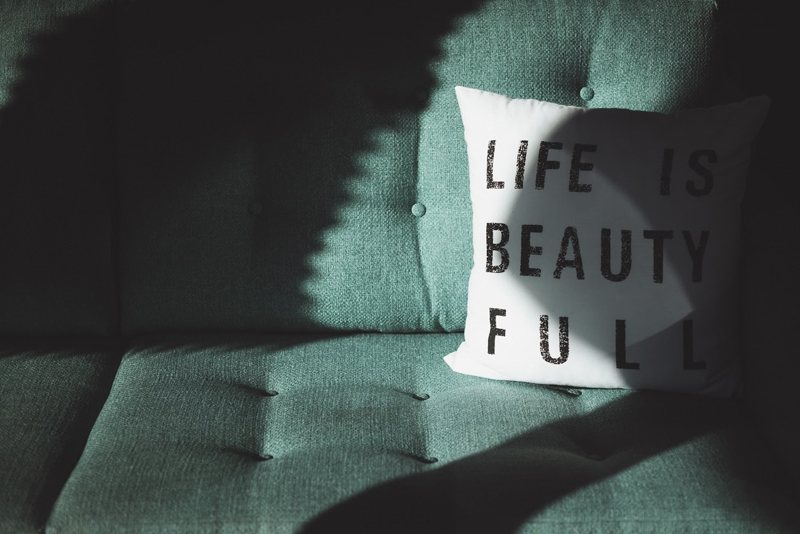
Sleep Deprivation Tip #2 – Create a Relaxing Environment
Make your bedroom a relaxing stress-free zone. Keep your light sources dim, use a fan or turn down the temperature to between 60-65 degrees and add blackout curtains to your windows if your room is too bright.
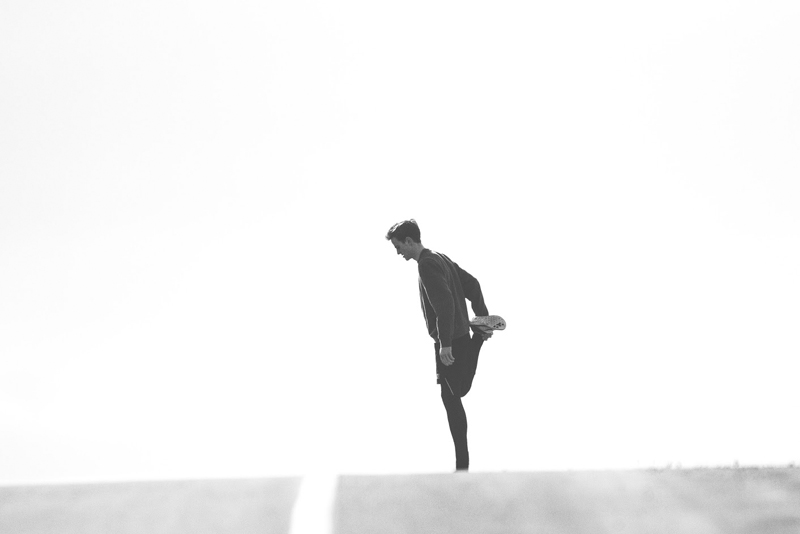
Sleep Deprivation Tip #3 – Stay Active
Add exercise [11] to your daily routine. Exercise helps every part of your body, including your brain and promotes more restful sleep. However, do not exercise within 2 hours of your bedtime.

Sleep Deprivation Tip #4 – Focus on Your Diet
Avoid going to sleep hungry or too full. Avoid foods or drinks contain stimulating ingredients [12] before bedtime. A healthy diet also ensures that your energy levels remain steady during the day so that you can naturally achieve a calm and relaxed state at night.
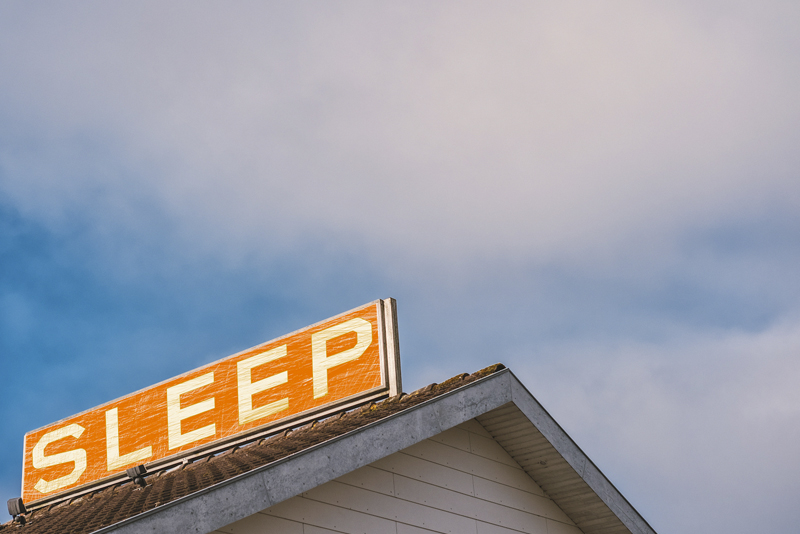
Sleep Deprivation Tip #5 – Limit Daytime Naps
If you plan on taking naps [13] during the day, make sure that they are no longer than 25 minutes. Napping for 30 minutes or more will put you into a deep REM stage of sleep making you feel less alert than before.
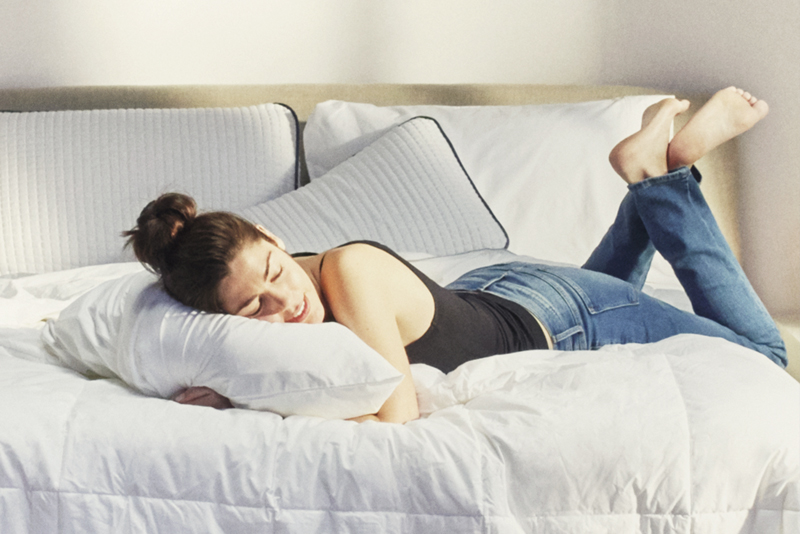
Sleep Deprivation Tip #6 – Get A Quality Mattress
All of the above efforts are null if you are sleeping on a poor mattress. Whether too hard or saggy, a bad mattress not only leads to poor sleep quality and quantity but it can also cause your body pain and discomfort upon awakening. For a better night’s sleep look for a cool, supportive mattress that contours to your body and fits with your favorite sleeping position.

Sleep Deprivation Tip #7 – Repay Your Sleep Debt
Studies [14] show that you cannot repay a sleep debt in a weekend’s time. Instead, add an extra hour or two of sleep a night over time. For those who suffer from chronic poor sleep, it can take a few months to reset your circadian rhythm.
Regarding recovery sleep, both the hours slept as well as the intensity of sleep is important. After all, our most refreshing sleep occurs during deep sleep. Over time, you’ll develop your own sleep pattern.

Sleep Deprivation Tip #8 – Try Natural Supplements
Talk to your doctor before you try any over-the-counter sleep aids. Many drugs can affect sleep quality. You want to ensure that any medication you take does not adversely interfere with other medications that you are currently taking.

Sleep Deprivation Tip #9 – Seek Outside Help
If the above methods don’t alleviate your sleep deprivation, consider scheduling a visit with your health care professional [15]. Often, your doctor will perform tests and upon review, will refer you to a sleep specialist. A sleep specialist will assess every aspect of your sleep time and identify the cause.
For instance, many times people do not know that they suffer from sleep apnea until they undergo testing. CPAP machines have made an incredible difference in the lives of many.
It is the same with restless leg syndrome [16]. Restless leg syndrome can affect [17] both the sleep health of the sufferer and their partner. Sleep specialists will offer step-by-step solutions on how to get the best sleep possible.
Table Of Contents
What Is Sleep Deprivation • How Sleep Works
Types Of Sleep • Insomnia vs Sleep Deprivation
Causes • Symptoms • Prevention

The Last Word On Sleep Deprivation
There is much to be gained in learning what sleep deprivation is all about, its side effects, and how to prevent it. Keep in mind that poor sleep can lead to tremendous health complications both in the short and long term. Getting proper sleep promotes good health and well-being and perhaps most importantly, a happier you.
Sleep Deprivation Resources;
[1] National Institute of Neurological Disorders and Stroke; Brain Basics: Understanding Sleep, July 06, 2018.
[2] Scientific American; Can You Catch Up on Lost Sleep?, Molly Webster, May 06, 2008.
[3] National Heart, Lung and Blood Institute; What Are Sleep Deprivation and Deficiency?.
[4] National Sleep Foundation; Stages of Human Sleep.
[5] Scribd; Claudio Stampi – Why We Nap, Evolution, Chronobiology, And Functions Of Polyphasic And Ultra Short Sleep, Claudio Stampi, 1992.
[6] Medscape; Insomnia vs Sleep Deprivation, Karl Doghramji, MD, 2005.
[7] Victoria State Government; Sleep deprivation, June 2014.
[8] Victoria State Government; Sleep deprivation, June 2014.
[9] National Center for Biotechnology Information; HPA Axis and Sleep, George Chrousos, MD, MACE, MACP, FRCP, Alexandros N Vgontzas, MD, Ilia Kritikou, M.D., January 18, 2016.
[10] U.S. Department of Health & Human Services; Sleep deprivation increases Alzheimer’s protein, April 24, 2018.
[11] National Sleep Foundation; How Does Exercise Help Those With Chronic Insomnia?.
[12] National Sleep Foundation; Caffeine and Sleep.
[13] Sleep, Powered By National Sleep Foundation; How Long Is an Ideal Nap?.
[14] Scientific American; Can You Catch Up on Lost Sleep?, Molly Webster, May 06, 2008.
[15] Health; When to Consult a Sleep Doctor: Guidelines for Insomnia, Apnea, and Other Disorders, The American Academy Of Sleep Medicine, February 29, 2016.
[16] National Sleep Foundation; Restless Legs Syndrome (RLS) And Sleep.
[17] Sleep Education; Restless Legs Syndrome – Overview and Facts.


